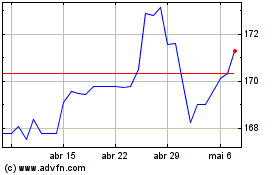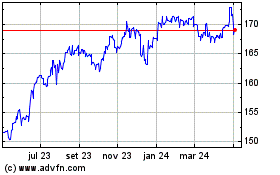Yen Falls After Ishiba's Surprise Win
01 Outubro 2024 - 3:37AM
RTTF2
The Japanese yen weakened against other major currencies in the
Asian session on Tuesday, as markets reacted to incoming PM Shigeru
Ishiba's support for the Bank of Japan's moves to raise interest
rates from their near-zero level and also backed other policies,
such as possibly raising corporate taxes.
With a majority of votes in both chambers of parliament, Ishiba,
the head of Japan's ruling Liberal Democratic Party (LDP), was
formally named prime minister on Tuesday. The market has been
keenly observing the implementation of his economic
initiatives.
Markets also reacted positively to remarks by U.S. Fed Chair
Jerome Powell, who suggested the central bank will continue to
lower interest rates but stressed the downward path for rates is
not on a preset course.
Powell's remarks partly offset optimism the Fed will continue to
lower interest rates aggressively in the coming months.
The Fed's next monetary policy meeting is scheduled for November
6-7, with CME Group's FedWatch Tool currently indicating a 65.3
percent chance the central bank will lower rates by 25 basis points
and a 34.7 percent chance of another 50-basis point rate cut.
In economic news, the unemployment rate in Japan came in at a
seasonally adjusted 2.5 percent in August, the ministry of Internal
Affairs and Communications said on Tuesday. That was below
expectations for 2.6 percent and down from 2.7 percent in July. The
jobs-to-applicant ratio was 1.23, which missed forecasts for 1.24 -
which would have been unchanged from the previous month. The
anticipation rate ticked up to 63.6 percent from 63.5 percent a
month earlier.
The latest survey from Jibun Bank revealed that the
manufacturing sector in Japan continued to contract in September,
and at a faster rate, with a manufacturing PMI score of 49.7.
That's down from 49.8 in August and it moves further beneath the
boom-or-bust line of 50 that separates expansion from
contraction.
Meanwhile, the Bank of Japan's quarterly Tankan Survey of
business sentiment showed large manufacturing in Japan was steady
in the third quarter of 2024, with a diffusion index score of +13.
That beat forecasts for a reading of +12 and was unchanged from
three months ago. The outlook came in at +14, matching expectations
and steady from the previous quarter.
The large non-manufacturers index came in at +34, beating
forecasts for +32 and up from +33. The outlook was +28, down from
+34 three months earlier. The medium manufacturing index was at +8
with an outlook of +9, while the medium non-manufacturing index was
at +23 with an outlook of +16. The small manufacturing index was at
0, while the small non-manufacturing index was at +14.
In the Asian trading today, the yen fell to 4-day lows of 160.91
against the euro, 193.37 against the pound and 170.71 against the
Swiss franc, from yesterday's closing quotes of 159.91, 192.02 and
169.82, respectively. If the yen extends its downtrend, it is
likely to find support around 167.00 against the euro, 198.00
against the pound and 174.00 against the franc.
Against the U.S., Australia, the New Zealand and the Canadian
dollars, the yen slipped to 4-day lows of 144.54, 100.11, 91.50 and
106.89 from Monday's closing quotes of 143.62, 99.27, 91.17 and
106.18, respectively. The yen is likely to find support around
149.00 against the greenback, 102.00 against the aussie, 93.00
against the kiwi and 110.00 against the loonie.
Looking ahead, manufacturing PMI reports from U.S. and Canada
for September and U.S. construction spending data for August are
slated for release in the New York session.
CHF vs Yen (FX:CHFJPY)
Gráfico Histórico de Câmbio
De Nov 2024 até Dez 2024

CHF vs Yen (FX:CHFJPY)
Gráfico Histórico de Câmbio
De Dez 2023 até Dez 2024
